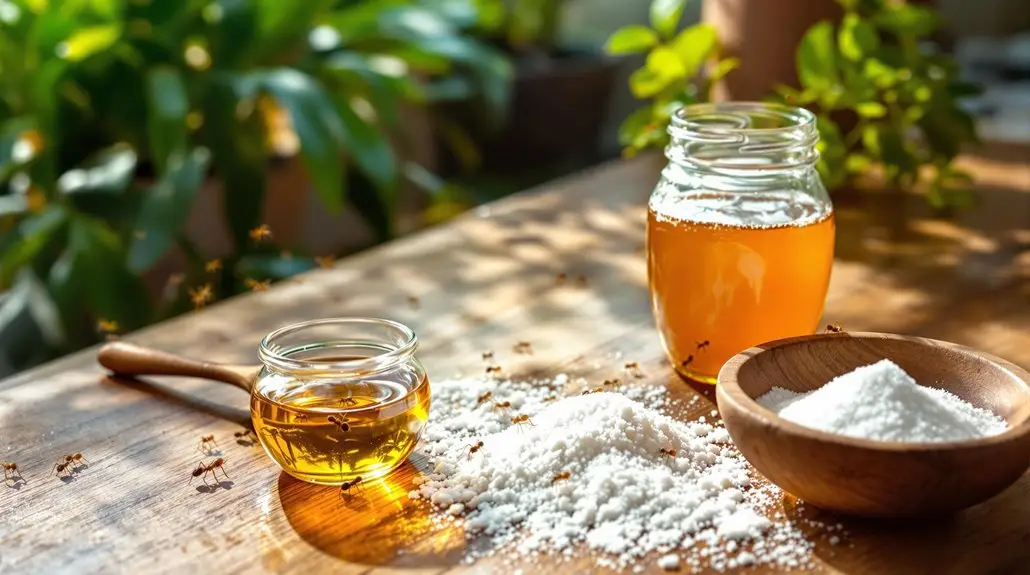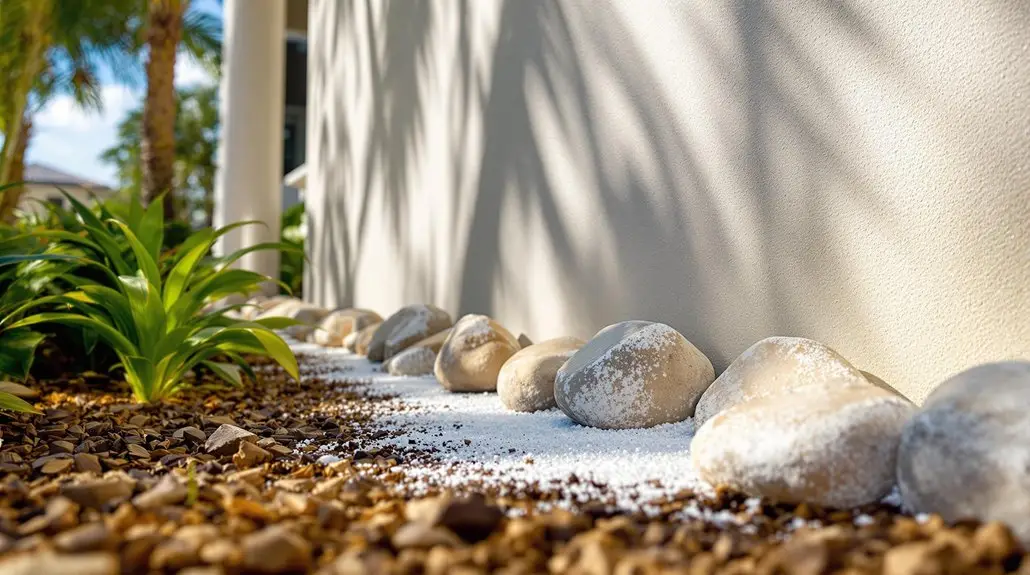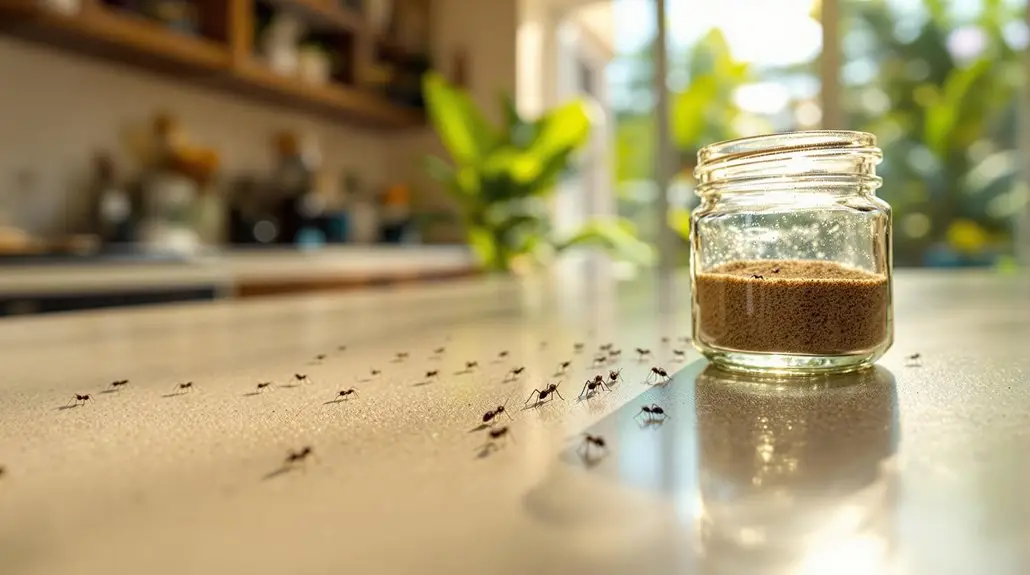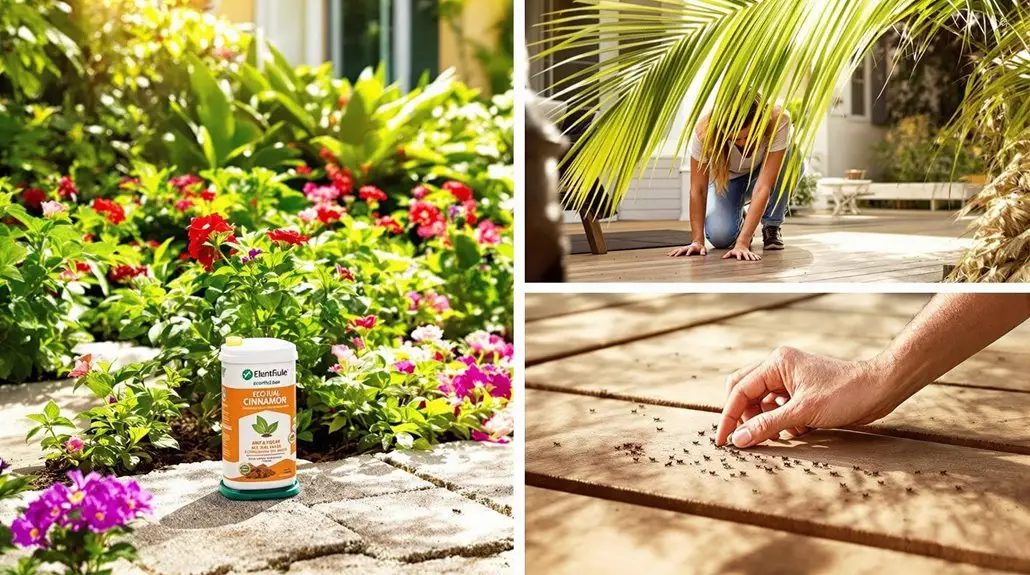If you’re dealing with ants in your South Florida home, natural treatments can be a secure and effective option. Start by identifying the specific ant species to tailor your approach effectively. Essential oils like peppermint and tea tree can disrupt their scent trails, while diatomaceous earth acts as a natural insecticide. You can also create homemade baits using borax and sugar to attract and eliminate them. Don’t forget to seal entry points and maintain cleanliness to prevent infestations. With the right strategies, you can keep your home ant-free. There’s much more to explore about effective ant management options.
Key Insights
- Use eco-friendly options like diatomaceous earth to dehydrate and eliminate ants without harming family or pets.
- Create homemade baits using a borax and sugar mix to attract and control ant populations effectively.
- Employ essential oils like peppermint and tea tree to disrupt ant trails and deter them naturally.
- Seal entry points and maintain cleanliness to prevent ants from invading your home in the first place.
- Consider professional intervention for large infestations to utilize specialized eco-friendly treatments when necessary.
Understanding Ant Problems in Florida
Ant problems in Florida are quite common, often leading to significant disruptions in homes and gardens. You might find yourself dealing with various species like Argentine ants, carpenter ants, fire ants, and ghost ants. Each of these pests has unique habits that can create chaos in your living space.
Argentine ants, for instance, are shiny and industrious, rapidly reproducing and forming massive colonies that can invade your home, especially near water sources. Nearly 20 different ant species can thrive in Florida, making it crucial to identify which ones are causing issues. The experienced team at NaturePest specializes in targeted eco-friendly solutions for effective ant control.
Carpenter ants can be particularly sneaky, nesting in decayed wood and excavating galleries in your home’s structure. They primarily forage at night, making it easy to overlook their presence until you notice signs of damage.
Fire ants, with their aggressive nature, can build unsightly mounds in your yard and deliver painful stings if disturbed. Their venom can even cause allergic reactions, making them a serious concern for families.
Ghost ants, on the other hand, are tiny and nearly transparent, often contaminating food in your kitchen before you even realize they’re there. You may spot trails along countertops or see dome-shaped mounds in your yard, signaling an infestation.
Understanding these specific ant problems is essential for maintaining a comfortable home. By recognizing the signs of infestation—like trails, food contamination, or structural damage—you can take proactive steps to reclaim your space.
With the right knowledge, you can foster a community that thrives, free from the disruption of these troublesome pests.
Benefits of Natural Ant Treatments
Embracing natural ant treatments offers numerous advantages that prioritize protection, effectiveness, and sustainability. By opting for these methods, you guarantee a secure environment for your family and pets while effectively managing ant infestations. NaturePest, a top-rated family-owned and operated pest control company, emphasizes these benefits in their holistic approach.
| Benefit | Description |
|---|---|
| Safety for Family & Pets | Non-toxic ingredients like diatomaceous earth guarantee protection. |
| Effectiveness | Natural remedies, such as vinegar solutions, disrupt ant trails. |
| Cost-Effectiveness | Many natural ingredients are inexpensive and readily available. |
| Sustainability | Eco-friendly methods minimize environmental pollution. |
| Long-Term Solutions | Preventive measures reduce the need for ongoing treatments. |
When you use natural ant treatments, you’re avoiding harmful chemicals found in conventional insecticides. For instance, homemade ant baits that combine borax and sugar are not only more secure but also effective against entire colonies. You’ll find that simple solutions like vinegar and water can disrupt ants’ scent trails, making it harder for them to navigate your home. Additionally, using diatomaceous earth is a great way to ensure that you are employing a non-toxic method that is effective in controlling ant populations.
Choosing natural ant treatments fosters a sense of community among those who prioritize health and the environment. You’re not just protecting your home; you’re contributing to a more secure world through sustainable practices.
Essential Oils for Ant Control

Natural ant treatments can be enhanced with the use of essential oils, which provide an effective and pleasant-smelling solution for controlling ant populations. Oils like peppermint, tea tree, lemon, eucalyptus, and cinnamon can disrupt ants’ scent trails, making it harder for them to communicate and navigate. Certain oils act as effective repellents against ants can further support your efforts in keeping these pests away.
To harness their power, you can create a simple spray solution by mixing your chosen essential oil with water and a few drops of dish soap. Spray this mixture along ant trails and entry points to deter them. You can also soak cotton balls in essential oils and place them in areas where ants frequently enter your home.
If you enjoy diffusing essential oils, consider using a diffuser in rooms with ant activity to keep them at bay. Focus on key areas like windowsills, baseboards, and the perimeter of your home. These spots often serve as entry points for ants. Additionally, using integrated pest management techniques can enhance the overall effectiveness of your pest control strategy.
Don’t forget the kitchen and bathroom, where ants are commonly found. Reapply your essential oil solutions every few days, especially after cleaning, to maintain their effectiveness.
While essential oils are a non-toxic and natural alternative to chemical pesticides, they work best for minor infestations. If you’re dealing with a larger problem, combining essential oils with other natural methods may yield better results.
Using Diatomaceous Earth Effectively
Diatomaceous earth is a powerful ally in your battle against ants, thanks to its unique ability to dehydrate and kill these pests. This natural insecticide works by piercing the exoskeleton of ants, causing rapid moisture loss that leads to their demise. You’ll find it’s non-toxic to you and your pets, making it a secure choice for your home.
To use diatomaceous earth effectively, apply it directly on ant trails, baseboards, floors, window sills, and wall cracks. A hand-held duster or squeeze bottle helps you target specific areas for even coverage. Before you start, wear gloves and a respiratory mask to protect yourself from irritation. Additionally, make sure to monitor cleanliness of treated areas to remove any pheromones that might attract ants back to the location.
And don’t forget to clean the area beforehand to maximize contact between the ants and the powder. Diatomaceous earth is effective against various species, including odorous house ants, carpenter ants, and fire ants. However, it’s most efficient when ants walk through it, so guarantee a thin, even layer.
Avoid large clumps, as they won’t do the trick. Keep in mind that diatomaceous earth remains effective as long as it stays dry. After rain or heavy watering, reapply. Regularly check for ant activity and refresh the powder as needed.
Once you’ve controlled the infestation, clean up the diatomaceous earth and any dead ants to prevent future issues. By incorporating this method into your ant control strategy, you can reclaim your space and enjoy a pest-free home together with your loved ones.
Creating Homemade Ant Baits

To create an effective homemade ant bait, mix Borax with sugar in a specific ratio to attract and eliminate ants. Once you’ve prepared your bait, think carefully about where to place it; targeting ant trails can greatly increase its effectiveness. Additionally, using various application techniques such as soaked cotton balls or spoonfuls on solid surfaces can enhance your bait’s accessibility to the ants.
Borax and Sugar Mix
Creating an effective homemade ant bait is simple with just two key ingredients: borax and sugar. These common household items work together to create a potent mix that lures ants while eliminating them.
To make your bait, you can follow a popular ratio of 1 part borax to 3 parts sugar, or adjust it to 2 parts borax to 1 part sugar for stronger results. You can also substitute sugar with honey or powdered sugar, and add a little water to achieve your desired consistency—liquid or paste.
Imagine mixing up a batch and seeing:
- The sweet scent of sugar enticing ants in your home.
- A thick paste of borax and honey, sticking to cotton balls.
- Ants carrying the bait back to their nest, unknowingly spreading the mixture.
- The satisfaction of a pest-free environment, where your family can gather without worry. Many homeowners in South Florida face challenges with common pests that can be effectively managed with natural solutions like this.
It’s important to note that the use of nontoxic products not only improves your home environment but also enhances overall well-being.
Remember to keep your bait out of reach of children and pets and avoid placing it near food.
With this simple borax and sugar mix, you’re taking a step toward reclaiming your space from unwelcome visitors.
Placement Strategies for Baits
When it comes to effectively placing homemade ant baits, understanding the behavior and habits of ants is key. Start by observing their trails to pinpoint where they enter your home. Look for cracks and crevices, especially around food sources like the kitchen. Ants often use greenery as bridges, so check those areas too.
Next, create enticing baits using ingredients like sugar, honey, or maple syrup mixed with a killer substance like yeast. Place these baits in high-traffic areas to guarantee ants find and carry them back to their colony. Use disposable containers with small holes to allow easy access, but make certain they’re out of reach of pets and kids.
For effective placement, use shallow lids on wood or laminate floors to protect surfaces. On solid, outdoor surfaces, avoid areas where water could wash the bait away. Additionally, be aware that ant colonies near homes can lead to infestations, so it’s crucial to keep your surroundings free of clutter to deter ants and seal cracks to prevent future infestations. Enhance your strategy by using natural deterrents like lemon juice along with baits. With these strategies, you’ll feel more confident in reclaiming your space from ants.
Vinegar Solutions for Ants
Vinegar solutions offer an effective and natural way to combat ant infestations in your home. By mixing equal parts of white vinegar and water in a spray bottle, you create a powerful tool to repel those bothersome ants. For a more concentrated approach, consider using pure white vinegar or mixing apple cider vinegar with water for a potent solution. Shake it well before applying to verify it’s fully blended.
When you spray the vinegar solution directly on ants, you disrupt their pheromone trails, making it difficult for them to navigate back to their colony. Additionally, using vinegar is a safe option because it does not harm ants, merely keeping them at bay. Many homeowners also find that utilizing environmentally friendly solutions like this can help maintain a healthier living space.
Applying it around common entry points like:
- Doorways, where ants often march in
- Windowsills, acting as a frontline defense
- Countertops, keeping your kitchen ant-free
- Ant trails, erasing their invisible paths
This not only repels ants but also helps prevent future infestations. The strong scent of vinegar is intolerable to them, masking their pheromones and confusing their sense of direction.
Plus, vinegar is harmless for your family and pets, making it an environmentally friendly alternative to harsh chemicals. Just remember to reapply regularly, as the scent fades over time.
Combining vinegar solutions with other natural methods can enhance their effectiveness. You’ll find that with a little effort, you can maintain a welcoming, ant-free home for everyone to enjoy.
Physical Barriers Against Ants

To effectively keep ants at bay, employing physical barriers can be just as important as using natural repellents like vinegar. You can take charge by creating obstacles that prevent ants from invading your home.
Start by applying sticky bands or ant moats around the foundation of your house. These simple solutions can stop ants in their tracks. For furniture, use petroleum jelly or adhesive tape around the legs of tables and chairs, making it harder for ants to climb.
Don’t forget about your doors! Installing door sweeps can block one of the most common entry points for ants. Weather stripping around doors and windows further seals off potential access points.
It’s essential to inspect your home regularly for tiny gaps or cracks; seal them with silicone-based caulk to keep ants out. Additionally, consider that regular inspections can help identify potential entry points before infestations occur.
In your landscaping, trim trees and shrubs that touch your home. This prevents ants from using them as bridges. Create a gravel or stone barrier around your property’s base, as ants prefer not to cross rough terrain.
Regular maintenance of outdoor areas is key—clean up debris and manage mulch use near your foundation.
Lastly, consider natural deterrent barriers. Essential oils like peppermint or citrus can be effective. Soak cotton balls in these oils and place them near areas where you’ve noticed ant activity.
Preventive Measures for Ant Infestations
To prevent ant infestations, start by sealing entry points around your home, as even tiny cracks can invite them in. Maintaining cleanliness is essential, so regularly wipe down surfaces and store food properly to avoid attracting these pests. Additionally, understanding ant behavior can help you identify potential nesting areas and further reduce the risk of infestations.
Seal Entry Points
While it’s easy to overlook small cracks and gaps around your home, sealing these entry points is essential in preventing ant infestations. Ants are crafty little creatures, and even the tiniest openings can become highways for them to invade your space.
Start by inspecting the exterior of your home and pay close attention to areas like:
- Cracks in the foundation that resemble tiny highways.
- Gaps around windows and doors letting in unwanted guests.
- Utility lines where electrical wires and pipes might create an entry.
- Branches or shrubs that bridge the gap between your home and the outdoors.
Once you’ve identified these areas, grab some silicone-based caulk to seal them up effectively.
Make sure your window screens and door sweeps are intact, as they play a significant role in keeping ants outside. Additionally, trim any vegetation that may touch your home, creating a barrier against these nuisances.
Regularly check your exterior for new cracks and seal them promptly. By taking these proactive steps, you’ll foster a home environment where you and your loved ones can feel secure and comfortable, free from ant invasions.
Maintain Cleanliness
Maintaining cleanliness is essential in keeping your home ant-free. Start by regularly wiping down countertops, tables, and other surfaces after meals to eliminate crumbs and spills that attract ants. A simple mixture of water and vinegar not only cleans but also deters these troublesome invaders.
Make it a habit to clean floors, especially in food prep areas, and pay attention to spots around sinks and stoves where food residue can linger.
Don’t let spills sit—clean them up immediately to keep ants from sniffing out sweet or sticky treats. Regularly sweeping or vacuuming helps remove crumbs, while mopping with a vinegar solution offers extra protection.
In the kitchen, keep things organized. Store food in sealed containers, and clear counters of clutter to minimize attractants. Check your pantry for expired items that might draw ants in.
Outside, maintain your yard by trimming back trees and bushes, removing debris, and keeping an eye on any food leftovers.
Proper Food Storage
Keeping your home clean is just the first step in preventing ant infestations; proper food storage plays a significant role as well. By guaranteeing food is stored correctly, you create an environment that’s less inviting for these annoying intruders.
Here are some effective strategies to keep ants at bay:
- Store food in tightly-sealed pest-proof containers.
- Keep ripe fruit in the refrigerator to prevent attracting ants.
- Use airtight containers for sugary foods, nuts, meats, and cheeses.
- Confirm all packages of food are tightly sealed to prevent ant access.
Additionally, keep your pantry and cabinets organized. Regularly check for expired items and clear out any infested food.
It’s also wise to avoid leaving food out, especially sweet or protein-rich options, and to clean up after meals promptly.
By following these simple yet effective food storage practices, you not only protect your home but also foster a warm, welcoming space for family and friends.
When to Call Professionals

When natural methods fall short, it’s time to contemplate calling in the professionals. You might feel frustrated if you’ve tried remedies that just aren’t getting the job done. Here are a few indicators that it’s time to reach out for expert help:
| Signs You Need Professionals | Why It’s Important | What Professionals Can Do |
|---|---|---|
| Large Infestations | Can cause damage & health concerns | Eradicate the entire colony effectively |
| Persistent Recurrence | Indicates unresolved issues | Identify and treat the root cause |
| Complex Ant Colonies | Hard to eliminate with DIY | Utilize specialized treatments and equipment |
| Protection and Health Concerns | Risks for pets and children | Use eco-friendly treatments that are suitable for all |
If you notice a large infestation, it often requires targeted treatments that natural methods can’t provide. If ants keep coming back, it’s a sign that the underlying problem hasn’t been tackled, and professionals have the expertise to break those troublesome pheromone trails.
Moreover, if you’re dealing with complex species like carpenter ants, their behavior and nesting habits can complicate DIY efforts. Finally, consider protection: if stings or bites could be an issue, or if children and pets are at risk, don’t hesitate to call in the experts. Ensuring your home is suitable and comfortable for everyone is what really matters.
Identifying Common Ant Species
Understanding the different species of ants that might invade your home is essential for effective treatment and prevention. By recognizing these common intruders, you can better address the specific challenges they pose and protect your living space.
Here are a few species you might encounter:
- Argentine Ants: Shiny and dark, these industrious ants build nests near water sources and can quickly contaminate surfaces with bacteria.
- Ghost Ants: Tiny and nearly transparent, they love kitchens and bathrooms, often sneaking into food before you even notice.
- Pharaoh Ants: Small and yellowish, they thrive in humid areas, making them hard to eliminate due to multiple nesting sites.
- White Footed Ants: Their dark bodies with light-colored legs often go undetected as they enter homes through small gaps.
Identifying these pests can help you respond appropriately.
For instance, if you see tiny trails in your kitchen, you might be dealing with ghost ants. If you find a mound in your yard, fire ants could be the culprits, and their aggressive nature means you’ll want to take action fast.
Long-Term Ant Management Strategies

To keep ants at bay, you’ll want to focus on preventive measures and effective natural repellents.
Start by sealing entry points and maintaining a clean environment, then explore long-term bait solutions for ongoing control.
Preventive Measures at Home
Effective long-term ant management requires a proactive approach that focuses on preventive measures at home. By taking the time to implement these strategies, you’ll create a welcoming environment that discourages ants from invading your space.
- Regularly wipe down surfaces to eliminate crumbs and spills, ensuring your kitchen stays spotless.
- Store food in sealed containers, denying ants any tempting food sources.
- Seal entry points with caulk, blocking cracks and crevices around windows and doors.
- Keep your yard tidy, removing debris and standing water that might attract ants.
Maintaining a clean and inviting home is essential for preventing ant infestations. Schedule regular cleanings, and educate your family on the importance of tidiness.
Don’t forget to trim back any trees or bushes that touch your house, as they can serve as bridges for ants.
Effective Natural Repellents
When it comes to keeping ants at bay, natural repellents offer a secure and sustainable solution for long-term management. You can create your own effective mixtures using household items, ensuring a protected environment for your family and pets. Here are some simple yet powerful natural repellents:
| Repellent | Description | Application |
|---|---|---|
| Peppermint Oil | Disrupts ant scent trails | Spray around entry points |
| Vinegar Solution | 50/50 mix of vinegar and water | Spray on surfaces |
| Diatomaceous Earth | Dehydrates ants; safe when food-grade | Sprinkle around entry points |
| Cinnamon | Repels ants when sprinkled | Use near food areas |
| Lemon Juice | Eliminates scent trails | Spray on ant trails |
You can also consider using barriers like lemon peels or catnip to further deter ants from invading your space. By embracing these natural solutions, you not only protect your home but also foster a sense of belonging to a community that values eco-friendly practices. Implementing these strategies will provide you with peace of mind, knowing you’re taking the right steps in your ant management journey.
Long-Term Bait Solutions
Long-term bait solutions are vital for managing ant infestations effectively. To create a lasting impact, you’ll want to implement tailored strategies that focus on the specific ant species invading your home. Understanding their habits is essential for your success.
Consider these key elements in your baiting approach:
- Identify the specific ant species to choose the right bait.
- Place baits in high-traffic areas, like along their trails and near food sources.
- Select baits that appeal to their preferences, whether sweet or protein-based.
- Monitor regularly to adjust your strategy as needed.
By opting for environmentally responsible baits, you’ll not only protect your family and pets but also contribute to a healthier ecosystem. Look for low-toxicity options that target the colony’s queen, ensuring that you won’t face re-infestation soon.
Additionally, sealing entry points and maintaining cleanliness in your home will complement your baiting efforts.
Eco-Friendly Pest Control Options
While many people resort to chemical pesticides for ant control, eco-friendly pest control options provide reliable and sustainable alternatives. You can create a more secure environment for your family and pets while effectively tackling ant problems. Here are some natural methods you can use:
| Eco-Friendly Option | Application |
|---|---|
| Peppermint Oil | Mix with water and spray on entry points. |
| Diatomaceous Earth | Sprinkle around the home’s perimeter. |
| Vinegar and Water Solution | Spray on surfaces to disrupt scent trails. |
| Homemade Ant Bait | Combine borax, sugar, and water to attract ants. |
Essential oils like peppermint, tea tree, and lemon can disrupt the scent trails ants rely on to navigate. You can mix these oils with water and spray them around entry points. Natural powders, such as diatomaceous earth or even garlic, can act as barriers or repellents.
For a homemade ant bait, mix borax with sugar to lure ants while slowly eliminating them. Simple solutions like vinegar or dish soap can also be effective in killing ants on contact.
To maintain an ant-free environment, focus on cleanliness, sealing entry points, and regular treatments with these eco-friendly solutions. By choosing natural methods, you contribute to a healthier home and community, encouraging others to prioritize sustainable practices too. Together, we can create a more harmonious living space.
Frequently Asked Questions
How Long Does It Take for Natural Treatments to Work on Ants?
When you’re using natural treatments for ants, the time it takes for them to work can vary. Immediate repellents, like essential oils and vinegar, might only last a few days, needing reapplication.
For longer-lasting results, options like diatomaceous earth can take several hours to days to dehydrate ants. Homemade baits might take several days to weeks to eliminate the colony.
Are Natural Ant Treatments Safe for Children and Pets?
When considering natural ant treatments, you’ll want to prioritize the security of your children and pets.
Many options, like peppermint oil and cinnamon, can be effective but may pose risks if not used properly. Always verify that you dilute essential oils and keep all baits out of reach.
It’s best to test any treatment in small areas first, so you can be confident it won’t cause harm while protecting your home.
Can I Use Essential Oils in a Diffuser for Ant Control?
While you might think a diffuser could create a fragrant fortress against ants, it’s not quite the knight in shining armor you need. The scent spreads too thin, lacking the punch to repel these annoying intruders.
Instead, consider a direct approach—mix essential oils with water and spray on surfaces where ants tread. This way, you’re crafting a stronger barrier, ensuring your space remains inviting for you, not for them.
What Weather Conditions Affect Ant Treatment Effectiveness?
Weather conditions greatly affect ant treatment effectiveness.
You’ll notice that high humidity and rising temperatures in spring boost ant activity, while summer’s relentless heat accelerates their reproduction.
As fall cools down, ants seek shelter indoors, especially with holiday leftovers around.
Even in winter, moist conditions keep them active.
How Often Should I Reapply Natural Ant Repellents?
You might think that once you apply a natural ant repellent, you’re done. But that’s not the case!
To keep those bothersome ants away, you should reapply your chosen solution regularly. With essential oils, do it after cleaning or when it rains. For homemade solutions, spray whenever you see ants.
Reclaim Your Home the Natural Way: Trust NaturePest Holistic Pest Control for Ant-Free Living!
In the battle against ants in your South Florida home, embracing natural treatments not only protects your space but also nurtures the environment. By harnessing essential oils, diatomaceous earth, and homemade baits, you can gently guide these uninvited guests away. For a truly effective and eco-friendly solution, consider reaching out to NaturePest Holistic Pest Control. Our expert team is dedicated to helping you reclaim your home while keeping Mother Nature smiling. Remember, if the situation becomes overwhelming, don’t hesitate to call in the experts. With a touch of patience and a natural approach, you can enjoy a pest-free home the holistic way!


